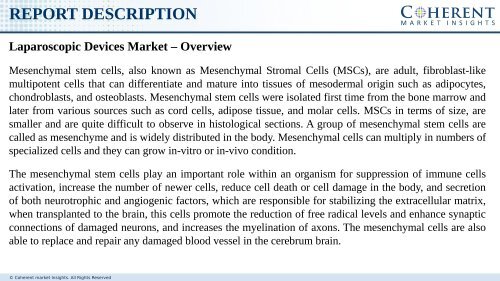Laparoscopic Devices Market – Global Industry Insights, Trends, Outlook, and Analysis, 2017–2025
The continuous advancement in laparoscopic devices and reduced cost of devices as compared to conventional devices made laparoscopic treatment affordable for middle class people gradually increase the growth of the market.
The continuous advancement in laparoscopic devices and reduced cost of devices as compared to conventional devices made laparoscopic treatment affordable for middle class people gradually increase the growth of the market.
Create successful ePaper yourself
Turn your PDF publications into a flip-book with our unique Google optimized e-Paper software.
REPORT DESCRIPTION<br />
<strong>Laparoscopic</strong> <strong>Devices</strong> <strong>Market</strong> <strong>–</strong> Overview<br />
Mesenchymal stem cells, also known as Mesenchymal Stromal Cells (MSCs), are adult, fibroblast-like<br />
multipotent cells that can differentiate <strong>and</strong> mature into tissues of mesodermal origin such as adipocytes,<br />
chondroblasts, <strong>and</strong> osteoblasts. Mesenchymal stem cells were isolated first time from the bone marrow <strong>and</strong><br />
later from various sources such as cord cells, adipose tissue, <strong>and</strong> molar cells. MSCs in terms of size, are<br />
smaller <strong>and</strong> are quite difficult to observe in histological sections. A group of mesenchymal stem cells are<br />
called as mesenchyme <strong>and</strong> is widely distributed in the body. Mesenchymal cells can multiply in numbers of<br />
specialized cells <strong>and</strong> they can grow in-vitro or in-vivo condition.<br />
The mesenchymal stem cells play an important role within an organism for suppression of immune cells<br />
activation, increase the number of newer cells, reduce cell death or cell damage in the body, <strong>and</strong> secretion<br />
of both neurotrophic <strong>and</strong> angiogenic factors, which are responsible for stabilizing the extracellular matrix,<br />
when transplanted to the brain, this cells promote the reduction of free radical levels <strong>and</strong> enhance synaptic<br />
connections of damaged neurons, <strong>and</strong> increases the myelination of axons. The mesenchymal cells are also<br />
able to replace <strong>and</strong> repair any damaged blood vessel in the cerebrum brain.<br />
© Coherent market <strong>Insights</strong>. All Rights Reserved


















